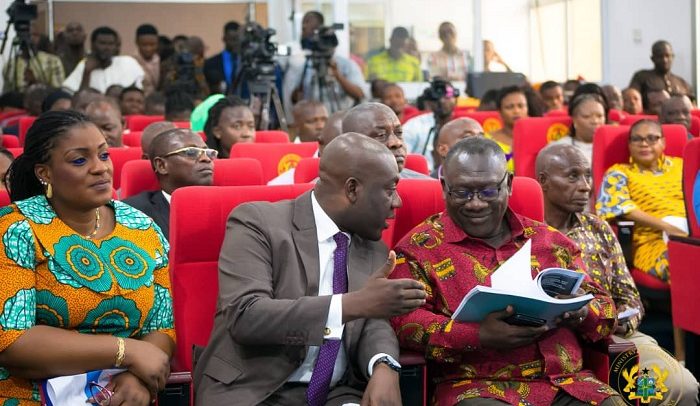Kojo Oppong Nkrumah and O.B. Amoah (right) – Deputy Minister for
Local Government and Rural Development
GOVERNMENT has developed a new Rural Development Policy, Minister for Local Government and Rural Development, Hajia Alima Mahama, has disclosed.
According to the Minister, the Policy would act as guide for service delivery and investment in rural communities across the 16 regions of the country.
Ms Mahama was speaking to journalists on Wednesday, May 29, 2019, in Accra at the Information Ministry’s Meet The Press Series.
She revealed that the Policy sought to among other things, modernize agriculture for rural growth and development, provide quality socio-economic infrastructure and services in a decent and secured environment.
It also aimed at maximizing the potential of rural areas towards rural enterprises development and industrialization, she said.
The Minister displayed the Policy document to journalists as she gave updates about the Ministry’s achievements and programmes since the President Nana Akufo-Addo’s administration took over in 2017.
The Minister mentioned that some projects had been completed under the Ghana Social Opportunities Project (GSOP).
According to her, they included Small Earth dams and some adapted for irrigation, 20 feeder roads and 78 Climate change interventions.
Job Creation
She said some 9,450 jobs have been created and total wage payments for the workforce stood at GH?5.67 million.
She indicated: “My Ministry in collaboration with the Ministry of Gender, Children and Social Protection (MoGCSP) has secured a US$60,000,000.00 facility from the World Bank to implement the Ghana Productive Safety Net Project.”
The Minister added that “an allocation of US$40,000,000.00 under Ministry of Local Government and Rural Development (MLGRD) will be used to deliver projects such Feeder roads, Small earth dams and dugouts and nurseries to produce 8 million fruit seedlings to be planted within a targeted area of 1,300 Hectares.”
According to her, the project would create 30,000 direct jobs, through a Labour-Intensive Public Works (LIPW) programme and provide grants to 25,000 individuals to start small businesses through a productive inclusion programme.
Through the implementation of the Integrated Rural Development Project (IRDP), implemented by the Social Investment Fund (SIF), she revealed, a total of 245 socio-economic infrastructure were being provided and at various levels of completion as follows:26 have been completed and in-use, 94 of them are within 51 – 99% completion rate; and 25 are below 50% completion rate.
She continued that “the implementation of these infrastructures has created 2,185 jobs and GHS14.04 million was paid as remuneration to the engaged persons. Under the micro-credit scheme of the IRDP, 6,204 farmers have been provided with a credit facility totaling GHS10,326,805.00.”
BY Melvin Tarlue


